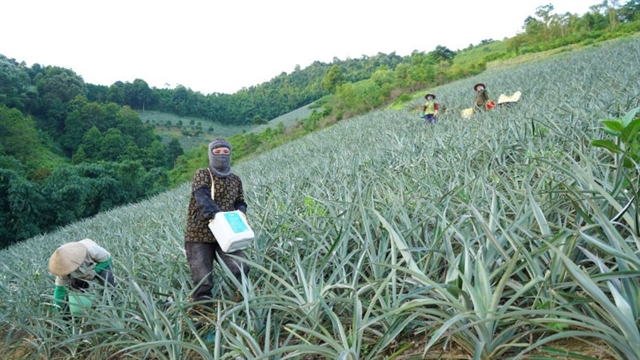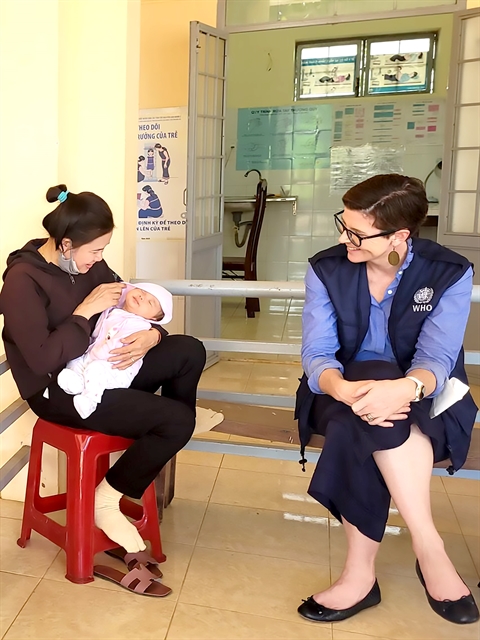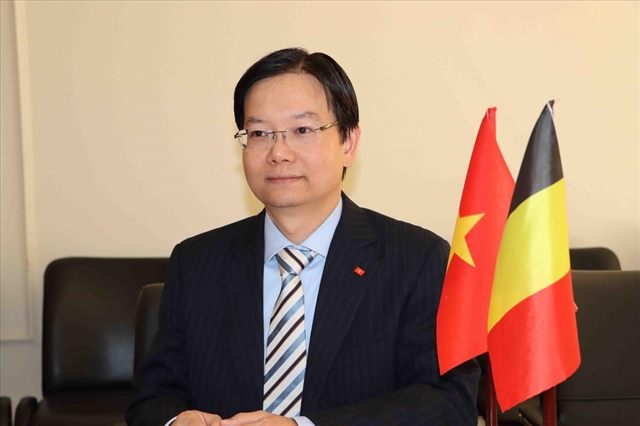 Society
Society

 |
| Dr Angela Pratt speaking with a grandmother after her granddaughter received routine immunizations in Buôn Đôn Village – Đắk Lắk Province. Photo Courtesy of WHO |
* Dr Angela Pratt
On this day 75 years ago, the World Health Organization (WHO) was established when the WHO Constitution, developed by countries joining together to stop the spread of dangerous diseases, came into force. Every year we now celebrate April 7 as World Health Day – a day to highlight the importance of health for all, reflect on public health achievements around the world, and look towards the health challenges that still lie ahead.
‘Health For All’ means every person being able to get the healthcare they need, when and where they need it, without financial hardship. It also means everyone has the conditions and supportive environment – like clean air, decent housing, and access to safe and healthy food – they need to live a healthy life. ‘Health For All’ envisions that all people have good health for a fulfilling life in a peaceful, prosperous, and sustainable world. And central to the ‘Health for All’ vision is a belief in the fundamental right of all people, everywhere, to enjoy the highest attainable standard of health.
Over the last three years, the COVID-19 pandemic demonstrated the fundamental importance of good health – as well as the systems and policies needed to create and sustain it. This once-in-a-century public health event showed us that when health suffers, everything suffers – including mental health, social well-being and economic development. COVID-19 also highlighted the terrible consequences of health inequity. When access to health services, medicines and products such as vaccines is not equitably shared, the most vulnerable and disadvantaged suffer the most.
While Việt Nam was not spared from the devastating social and economic impacts of the pandemic, there is good reason to take pride in the country’s response. In the early phases of the pandemic, Việt Nam did well at keeping cases and deaths low – through strong public health and social measures, good healthcare capacity, and of course the tireless efforts of healthcare workers. Việt Nam also did an incredible job of vaccinating the population against COVID-19 in late 2021 and early 2022; the speed and scale of the rollout, including efforts to ensure vaccines reached every corner of the country, is one of the great success stories of this country’s COVID-19 response, and of this Region more broadly. Though the pandemic is not over yet, Việt Nam is currently in a very stable phase, and there is cause for hope that the end of the global public health emergency may be near. The Government of Việt Nam, including the Ministry of Health, healthcare workers, businesses, communities and partners should all be commended for their efforts.
This World Health Day is therefore an important opportunity to reflect on the lessons we have learned during the pandemic – about the importance of health, strong health systems and health equity. It is also an opportunity to reflect on the broader health achievements of the government and people of Việt Nam, as well as to acknowledge and plan for the challenges we still face.
In the past few decades, Việt Nam has overcome many hardships – and taken enormous strides forward in improving quality of life. In the early 1960s, the average life expectancy was just 60 years. In contrast, a baby born in Việt Nam today can expect to live for at least 75 years – thanks to advances in child and maternal health, massive reductions in vaccine-preventable diseases including the elimination of polio, improvements to health services, and the benefits to health of Việt Nam’s successes in reducing poverty.
More recently, there has been significant progress toward ending ongoing epidemics of infectious diseases. Take malaria, for example; just over 30 years ago, Việt Nam carried the burden of one million malaria cases a year, with approximately 4,600 deaths. Last year the total number of cases was just 455, with no outbreak since 2016. There is still work to do to achieve the goal of malaria elimination, but the target is firmly within reach – and this in itself is a noteworthy achievement.
Social health insurance has also been significantly expanded, advancing Việt Nam’s progress towards universal health coverage by providing more support for people to access essential health services and greater financial protection from the cost of doing so. Universal health coverage helps to lift people out of poverty, promote the well-being of families and communities, protect against public health crises, and move communities everywhere closer to the goal of health for all.
While much has been achieved, like other countries, Việt Nam still faces some serious public health challenges. These include ongoing infectious disease threats: like the centuries-old scourge of tuberculosis; the rising tide of non-communicable diseases such as cardiovascular disease, cancer and diabetes, driven largely by preventable lifestyle factors such as smoking, unhealthy diets and excessive consumption of alcohol; and, the health impacts of the changing environment and climate, such as respiratory illness caused by air pollution, and increases in other vector-borne diseases such as dengue, as a result of changing weather patterns. Further, the benefits of advances in areas such as child and maternal health have not been distributed equitably – with some remote and disadvantaged communities, in particular ethnic minority groups, still facing high rates of malnutrition and poor access to basic health services.
In addition, Việt Nam’s population is aging rapidly, and its economy fast developing – both of which are already creating an increased demand for high-quality health services. Responding to this demand and to the changing needs of the population will require efforts to strengthen the health system, with a particular focus on stronger primary health care. Investing in strengthening the health system, especially at the primary healthcare level will deliver dividends not only for health but also contribute to advancing the country’s broader social and development goals.
While the list of health challenges still facing Việt Nam is considerable, the foundations for tackling these challenges are strong: high-level political commitment and government leadership, committed and capable partners, and dedicated health workers – like Dr. Phan Thị Thuyết, Director of the Tân Hóa Commune Health Centre in Đắk Lắk Province, who I was privileged to meet a few months ago. I was so impressed by the care and commitment of Dr. Thuyết and her team in ensuring every child within their commune was vaccinated against life-threatening diseases. With stronger laws and policies at the national level to provide more support and resources to local health services, like those led by Dr. Thuyết, the future looks bright.
As we face this future together, WHO is grateful to be a trusted partner to the Government of Việt Nam, bringing WHO’s global knowledge and expertise to the health challenges facing this incredible country. On our 75th anniversary, we know there is a great deal more to do to achieve the WHO Constitution’s vision of the “enjoyment of the highest attainable standard of health” for every human being, in this country and around the world. But here in Việt Nam, we’re proud to be working alongside the government, partners and healthcare workers on the journey to better health for all. VNS
*Dr Angela Pratt is WHO representative in Việt Nam




